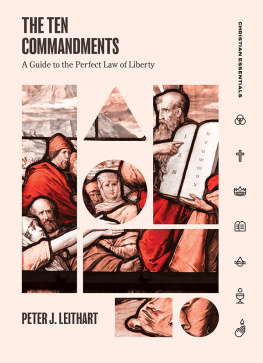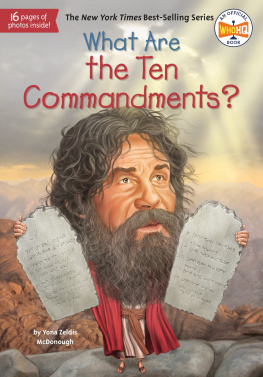Monsignor Charles Pope - The Ten Commandments
Here you can read online Monsignor Charles Pope - The Ten Commandments full text of the book (entire story) in english for free. Download pdf and epub, get meaning, cover and reviews about this ebook. year: 2014, publisher: TAN Books, genre: Religion. Description of the work, (preface) as well as reviews are available. Best literature library LitArk.com created for fans of good reading and offers a wide selection of genres:
Romance novel
Science fiction
Adventure
Detective
Science
History
Home and family
Prose
Art
Politics
Computer
Non-fiction
Religion
Business
Children
Humor
Choose a favorite category and find really read worthwhile books. Enjoy immersion in the world of imagination, feel the emotions of the characters or learn something new for yourself, make an fascinating discovery.

- Book:The Ten Commandments
- Author:
- Publisher:TAN Books
- Genre:
- Year:2014
- Rating:4 / 5
- Favourites:Add to favourites
- Your mark:
- 80
- 1
- 2
- 3
- 4
- 5
The Ten Commandments: summary, description and annotation
We offer to read an annotation, description, summary or preface (depends on what the author of the book "The Ten Commandments" wrote himself). If you haven't found the necessary information about the book — write in the comments, we will try to find it.
The Ten Commandments — read online for free the complete book (whole text) full work
Below is the text of the book, divided by pages. System saving the place of the last page read, allows you to conveniently read the book "The Ten Commandments" online for free, without having to search again every time where you left off. Put a bookmark, and you can go to the page where you finished reading at any time.
Font size:
Interval:
Bookmark:

Copyright 2014 Charles Pope
All rights reserved. With the exception of short excerpts used in articles and critical review, no part of this work may be reproduced, transmitted, or stored in any form whatsoever, printed or electronic, without the prior written permission of the publisher.
Scripture quotations are from the Catholic Edition of the Revised Standard Version of the Bible, copyright 1965, 1966 National Council of Churches of Christ in the United States of America. Used by permission. All rights reserved.
Cover design by Caroline Kiser.
ISBN: 978-1-61890-629-8
Published in the United States by
TAN Books
PO Box 410487
Charlotte, NC 28241
www.TANBooks.com
Printed and bound in the United States of America
Think not that I have come to abolish the law and the prophets; I have come not to abolish them but to fulfill them unless your righteousness exceeds that of the scribes and Pharisees, you will never enter the kingdom of heaven (Mt 5:17,20) These words of Jesus remind us of the interpretive key to the Law which we discussed in the last flier. The scribes and the Pharisees of Jesus time interpreted the Law in strictly legal fashion. This led them to understand each commandment is a minimalist fashion. The command not to kill was understood as only a law against the unjust taking of life. It meant purely and simply that we were not to murder. But Jesus says we must move beyond such a narrow view and He interprets the Law more fully from the standpoint of love: You have heard that it was said to the men of old, You shall not killBut I say to you that every one who is angry with his brother shall be liable to judgment; whoever insults his brother shall be liable to the council, and whoever says, You fool! shall be liable to the hell of fire . (Mt 5:2122). Thus, for Jesus the Commandment, You shall not kill is about more than just taking life. It is about all the attitudes and evil deeds that lead to murder: wrathful anger, attitudes of contempt, revenge, bitterness, and hatred. Jesus asks us to consider all the implications of Gods Law. He does this because we are called into a relationship of love and trust of God. God commands us and sets limits for us not because He is out to make life difficult or to take away our fun. God commands because he loves us and does not want us to be trapped in the painful realities of sin and evil. Through the grace He gives us Jesus enables us to trust the Father and to love Him. Love does not treat the law as an imposition but as a gift. Love does not seek to avoid the Law by asking, What is the least I can do to just get by? Loves response is extravagant. It embraces the Law and asks, What more can I do? This is the disposition of heart that Jesus gives us by his grace. As we examine each commandment we will apply Jesus interpretive principal.
We will look at the fuller and inner meaning of each command and see the freedom and truth to which each command points. We do this in trust of God who does not command without first giving us the grace, the power, to keep what He mandates ( cf . 1 Cor 10:13). As a final preliminary comment, note how Jesus points to love as the foundation of the commandments. And one of them, a lawyer, asked him a question, to test him. Teacher, which is the great commandment in the law? And he said to him, You shall love the Lord your God with all your heart, and with all your soul, and with all your mind. This is the great and first commandment. And a second is like it, You shall love your neighbor as yourself. On these two commandments depend all the law and the prophets (Mt 22:37ff). Love contains the whole law. A man who loves his wife does not need a command that says, Do not break her arm. One who loves already understands this. The twofold summary of the Law by Jesus on the basis of love also helps us to sort out the Ten Commandments. The first three commandments specify the command to love God absolutely. The remaining seven spell out what it means to love our neighbor. We are now ready to look at the first commandment.
I AM THE LORD YOUR GOD. YOU SHALL NOT HAVE STRANGE GODS BEFORE ME.
I am the Lord your God: you shall not have strange gods before me (Ex 20:217; Dt 5:62). Is God merely jealous here? Why is he so exclusive in his demand to be worshiped? Perhaps the best way to understand this commandment is to understand that God seeks to protect us from false claimants to our worship and obedience. The history of the ancient world shows a long sad history of the confusion that arises from the false gods, which had influence. Some of these false religions and cults demanded human sacrifice, many enshrined bizarre sexual practices and called for numerous and costly sacrifices. Most of them also fostered fears and superstitions to hold their power over people. The Greeks even had an altar to the unknown god ( cf . Acts 17:23) and offered worship just in case such a god existed and he (or she), angry at not being worshiped, would seek to bring about destruction of some kind. There were many confusing and contradictory claims and demands that bewildered much of the ancient world. Even if these ancient religions contained some elements of the truth, they were incomplete expressions of the truth and contained numerous errors. Though too lengthy to reproduce here, a rather vivid and terrifying description of the evils and sorrows resulting from false worship is given in Rom 1:18 ff .
In the first commandment, God seeks to preserve His people from such bewilderment and sorrow. He alone is the Creator Lord who made all things. We can and must trust Him in all things for he is able. He gives us the one and only truth by which we may be saved. Since He alone is all-powerful we need not worry of the anger or power of other gods for if they exist at all, the Lord our God is God of gods and Lord of lords (Dt 10:17). God therefore speaks to us in love and commands us to worship Him alone, to trust him in all things and serve him by our obedience. Only in God will my soul be at rest; from him comes my salvation. He only is my rock and my salvation, my fortress; I shall not be greatly moved . (Ps 62:12).
The first commandment is much more than a law against worshiping idols. It is a summons to a whole way of life. God calls us to the absolute obedience of faith in Him who is faithful just, and trustworthy without any evil. We ought therefore to accept his words and have complete faith in him and not fail to acknowledge God is merciful, infinitely good, and all-powerful. So we should place our hope in him and be grateful for the goodness and love he has poured out on us. In the Scriptures this is often recalled when at the beginning or end of reciting some aspect of the Law, the phrase I am the Lord. Is used. It is Gods way of saying, It is I, the Lord who loves you and provides for you who speak this to you. Trust me (see CCC 2086)
Since faith is such an important response to the first commandment it also follows that we must nourish and protect our faith with prudence and vigilance, and to reject everything that is opposed to it. Many today take lightly the duty to know the sacred truths of our faith revealed by God. Yet many of these same individuals have detailed and through knowledge of worldly matters. Though it is not wrong to learn of the things of this world, when it is paired with a willful neglecting of the truths revealed by God may well show where our true priorities lie and exhibit a form of idolatry. Idolatry refers to false pagan worship and consists in considering divine what is not God. We do this when revere a creature in place of God, This could by revering what others consider as gods or by worshipping demons (as Satanists do), but it can also including treating power, pleasure, money or popularity as idols. (see CCC 2112).
Next pageFont size:
Interval:
Bookmark:
Similar books «The Ten Commandments»
Look at similar books to The Ten Commandments. We have selected literature similar in name and meaning in the hope of providing readers with more options to find new, interesting, not yet read works.
Discussion, reviews of the book The Ten Commandments and just readers' own opinions. Leave your comments, write what you think about the work, its meaning or the main characters. Specify what exactly you liked and what you didn't like, and why you think so.








